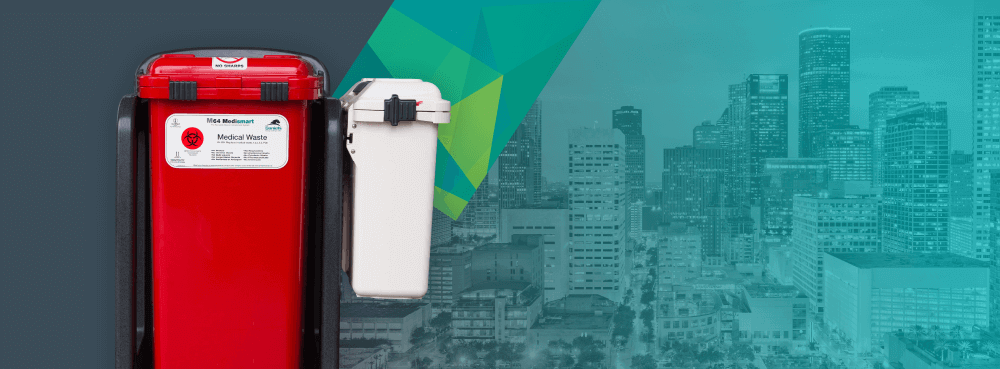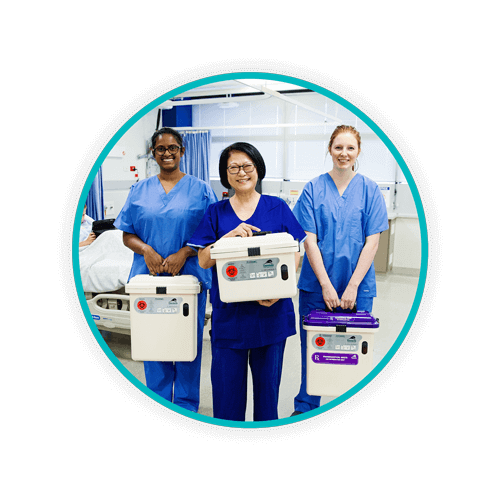Biohazardous Waste Management in Houston

The city of Houston takes its biohazardous waste regulations seriously. In the state of Texas, regulations for hazardous waste are enforced by multiple agencies. Houston-based healthcare facilities and healthcare workers who know the rules about biohazard waste management avoid fines and penalties associated with non-compliance and the black eyes to reputation that go with them.
For these reasons, a clear understanding of biohazardous waste applicable to Houston healthcare facilities is essential. In many areas, Houston included, confusion of the difference between certain medical waste terms is common – such as biohazardous, hazardous, and infectious. However, biohazardous waste and hazardous waste are the same in the sense that they both have the potential to cause infection, harm, or contamination through contact with dangerous.
Home to one of the largest medical centers not only in the United States, but in the world, we trust that most Houstonites know all about regulations when it comes to medical waste disposal. But let’s review just in case.
Just one facility – the Texas Medical Center – encompasses over 1,000 acres and averages over 7 million visits every year. More heart surgeries are performed in this facility than anywhere else in the world. That site is going to generate a lot of biohazardous and other wastes. With great healthcare comes great amounts of medical wastes and cradle-to-grave responsiblity for that waste.
Where do you find Houston medical waste regulations?
Texas medical waste regulations and requirements are found in federal and state legislation, with specific and detailed requirements found within the Texas Administrative Code (TAC) and the Texas Commission on Environmental Quality (TCEQ).
Basically, the state of Texas defines five categories for regulated medical waste (FYI, biohazardous waste is regulated):
- Pathological waste
- Sharps
- Bulk blood, both bulk blood products, and bulk human body fluids (as well as that of a contaminated animal)
- Microbiological waste
- Waste from animals that have been intentionally exposed to pathogens (laboratory research)
Pathological waste can include any human or animal tissue such as skin or muscle, organs as well as body parts that have been removed from a human or animal during a surgical procedure or autopsy that may also be contaminated with an infectious agent that poses dangers to human health.
Microbiological wastes can also be biohazardous, specifically those defined as specimen cultures containing parasites, viruses, bacteria or other microorganisms that may increase the risk of contamination of something that causes illness or injury, disease, or risk of death.
Blood or blood fluid products or components may also be considered as infectious, hazardous or biohazardous waste. Such items are commonly found in healthcare scenarios and include everything from a cotton swab to used tissues or human waste. Soiled bandages, dressings, and even personal protective equipment contaminated with infectious bodily fluids including urine, blood, sweat, or mucus can also be classified as biohazard or hazardous waste.
Sharps (meaning needles) that may be contaminated are also considered biohazardous. However, sharps waste also includes knives, scalpels, syringes, infusion sets, or in other words, anything that has a sharp edge that may cut/or tear skin.
The city of Houston, like other cities throughout Texas, are required to follow not only federal but state guidelines of the Texas Commission on Environmental Quality.
Rules and guidelines for hazardous/biohazardous waste permits includes facilities in Houston in regard to procedures for obtaining permits related to hazardous waste management.
Healthcare facilities dealing with biohazard waste and waste management must complete and submit permit application packages that include forms, administrative and technical evaluation checklists. These are described in more detail and are available through the TCEQ website.
Houston is home to a diverse population, and for those who don’t know, Houston is populated and entertained by more than cowboys, livestock shows, and rodeos. In addition to its numerous cultural, culinary, and shopping attractions, it also happens to be the fourth most populated city in the United States, averaging just over two million residents. That means lots of healthcare facilities, outpatient centers, clinics, and of course hospitals.
Daniels Health has your back, Houston!
Every facility that performs any type of medical procedure or healthcare should stay up-to-date on codes and regulations when it comes to medical waste management. Daniels Health is experienced with codes, local, state and federal regulations when it comes to biohazard waste management in Houston as well as other cities around the country. Don’t take chances.
Our primary goals are to reduce risk of blood-borne pathogen exposure and hospital-acquired infections as well as protection against sharps injury scenarios. For more information on how Daniels Health can ensure compliance and save you money when it comes to biohazardous waste management, call us today.
Let's Talk!
Your time is valuable, and we don’t want to play hard to get. You can either phone us directly on the details listed on our contact page, or feel free to fill out this short form and one of our team members will get back to you as quickly as possible.
